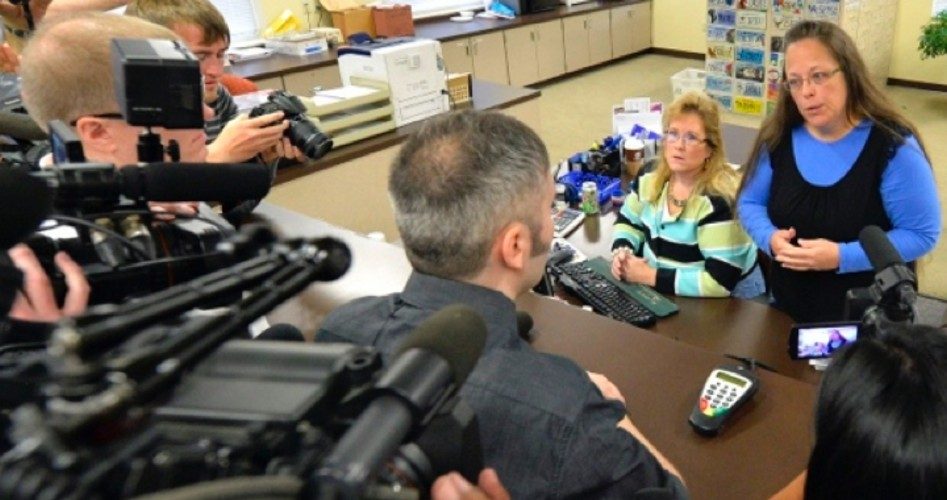
Few people take moral stands today that could land them in prison, but Kim Davis (shown) is an exception. The Rowan, Kentucky, county clerk has made national news by refusing to issue marriage licenses to anyone — homosexual or straight — since the Supreme Court’s unconstitutional June Obergefell faux-marriage ruling. And now Davis has doubled down, defying courts that have ordered her to resume issuing licenses, even though the Supreme Court has just decided not to support her position. In explaining why she is unbowed, Davis says that she’s acting “under the authority of God.” The New York Times provides some background:
After the state’s governor told county clerks to issue marriage licenses to all eligible couples [in Obergefell’s wake], Ms. Davis filed suit in federal court, arguing that she should be excused from the obligation, given her religious beliefs. A District Court judge ruled against her, as did the Sixth Circuit Court of Appeals, and she appealed to the Supreme Court.
On Monday, a stay granted by the District Court expired, and the Supreme Court rejected without comment Ms. Davis’s emergency application for a new stay, pending the outcome of her appeal. That left her no legal grounds to refuse to grant licenses to same-sex couples.
{modulepos inner_text_ad}
But moral grounds are enough for the intrepid Davis. This is despite the scene Tuesday at her Rowan County Courthouse, which included activist-minded same-sex couples seeking marriage licenses, clamorous protesters on both sides of the issue, and camera-wielding media. It is also despite the great legal risk Davis is taking. As Daniel Canon, a lawyer for some of the same-sex couples seeking licenses, said, reports the Times, “‘She’s certainly in contempt of court by any definition of the term, so the District Court has an array of sanctions it can resort to, to deal with that.”
Perhaps. But what of judges who are in contempt of the Constitution?
One person who might ask this question is Kentucky Republican gubernatorial candidate Matt Bevin, a defender of Davis’. As the Courier-Journal tells us, “Bevin … scolded Democratic opponent, Kentucky Attorney General Jack Conway, for failing to stand by the religious liberties of county clerks who oppose the U.S. Supreme Court’s ruling legalizing same-sex marriage. ‘Jack Conway has failed to do his job as attorney general by refusing to defend Kentucky’s marriage amendment, and he is failing to defend the religious freedom of our Kentucky clerks,’ Bevin said in a statement.”
Having said this, the question of freedom and legality here may be complex. The Supreme Court’s Obergefell ruling is clearly unconstitutional. It’s also apparent that most governors are acting in ignorance of the Constitution at best, with contempt for it at worst, as they have an obligation to oppose unconstitutional rulings. As for Davis, while her stand is admirable and morally correct (and morality does trump legality), it may be that it is also illegal; this is because her governor, Democrat Steve Beshear, has ordered state clerks to issue marriage licenses to same-sex couples, and states have wide-ranging powers under the Constitution.
And this brings us to one of the real issues here: The stand Davis is taking should have been taken by her governor. Instead, he and other chief executives abide by the personal rules of lawyers while talking about the “rule of law,” as not one state governor in 50 has the wisdom and courage to understand that an unlawful (unconstitutional) court ruling is no law at all. So, really, Americans like Davis are, in a moral sense, doing the jobs governors won’t do.
When pondering defiance of the courts, note that the appeals court in Davis’ case ruled that an officeholder may not decline “to act in conformity with the United States Constitution.” No doubt. But does this not include the officeholder known as a judge? So, again, at what point do legislators and chief executives just say no to the Supreme Court?
“Never!” is the answer many give. “The Supreme Court is just that — supreme — and it has the final say on law’s meaning.” The problem with this is that it’s supremely naïve to suppose that officeholders will “act in conformity with the United States Constitution” if there’s absolutely no consequence for doing otherwise. To vow obeisance to Supreme Court rulings, no matter how far afield from the Constitution’s (the supreme law’s) letter, is to turn the Court into a de-facto oligarchy. It is to empower it to become a super-legislature of last resort with the final say, to embolden it to the point of brazenness. But we have three branches of government for a reason. And if we wouldn’t give 435 elected congressmen, 40 percent of whom are lawyers, such power, why would we give it to nine unelected lawyers on the Supreme Court? We ought to remember that while God’s law and not man’s is supreme, the Supreme Court isn’t even supreme from a legal standpoint — the Supreme Law of the land is.
Note now that this is precisely the position Founding Father Thomas Jefferson took. He pointed out almost 200 years ago that if the notion that judges were the ultimate arbiters of the law’s meaning ever became accepted, our Constitution will have become a “felo de se” (“suicide pact”) and our Supreme Court an “oligarchy.” He also instructed that right-minded nullification — which is simply when states declare that since a given federal action is unconstitutional, they will not abide by it — is the “rightful remedy” for any and all unconstitutional federal dictates.
Whatever the legality of a matter may be, however, it’s of no consequence to an individual convinced that the highest law deems man’s law lawless. And thus have principled people, from the Apostles to Sir Thomas More to Kim Davis, martyred themselves in faith’s name. Of course, saying one is acting “under the authority of God” generally brings eye-rolling in these secular times. But this is because a simple reality is now universally overlooked: We may be able to have a separation of church and state, but there can never be a separation of church and just law. As I explained in 2012:
Any law is the imposition of a “value,” but a just law is more specific: it imposes morality. After all, a law states that there is something we must or mustn’t do. But why must or mustn’t we? Sure, it could be because monarchs or masses feel like it and have the power, but that’s simply might making right. For a law to be just, what is prescribed or proscribed must be, respectively, a moral imperative or morally wrong — or a corollary thereof. To dispute this is to say that you would prohibit something even though it’s not wrong or mandate something even though it’s not a good. What would be the point? Only tyrants do that.
So a just law must reflect morality, but what is morality? Who determines it? There are only two possibilities: man or something outside of man does. Let’s consider the implications of each one.
Imagine that 95 percent of humanity liked chocolate and disliked vanilla. Would this make vanilla “wrong” or “immoral”? Of course not. We know such things are mere matters of taste. Okay, but then how can we rightly claim that murder, rape, or slavery is “immoral” if the only reason we’re doing so is that the vast majority of us don’t happen to like it? If the only argument we can hang our hat on is consensus preference, then it falls into the same category as flavors: taste.
Some will now point out that the aforementioned acts hurt others, but who is to say that’s wrong? Exasperated, you may now say “Everybody! That’s who!” But “everybody” is people, so we’re again down to consensus preference. It’s a merry-go-round always bringing us back to the same pointless point. And there’s only one way off it.
This is to accept the point: the one way we can rightly say an act is “wrong” or “immoral” is if something outside of man and supreme (i.e., God) has deemed that it’s so — is if it’s dictated by the objective reality called Truth.
…So here are the dots and destination: a just law must reflect morality. Morality implies God. Things of God are discussed and discovered in the realm we call religion. Therefore, religion must and always does shape law — if that law is to be just. There is no way around it.
This is perhaps part of the reason John Adams said in 1798, “Our Constitution was made only for a moral and religious people. It is wholly inadequate to the government of any other.” And you become an “inadequate … other” when you substitute the Supreme Court for the Supreme Being.
Photo of county clerk Kim Davis: AP Images



